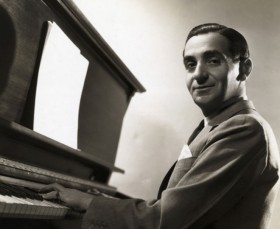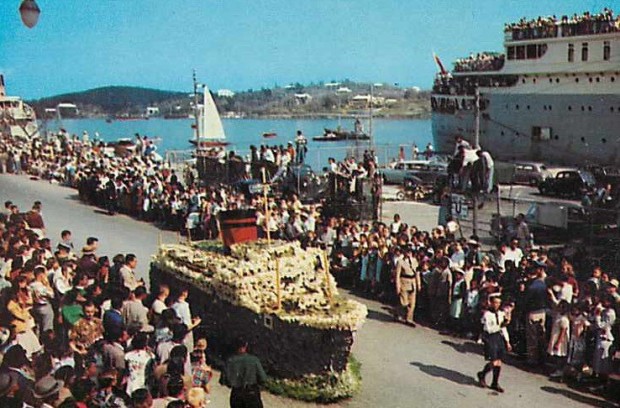Irving Berlin And Bermuda’s Easter Parade
 Quintessential American songwriter Irving Berlin [pictured] — and his battered piano — arrived in Bermuda in 1933 in time for the Easter season and the annual floral pageant which used to wind its way through the streets of Hamilton.
Quintessential American songwriter Irving Berlin [pictured] — and his battered piano — arrived in Bermuda in 1933 in time for the Easter season and the annual floral pageant which used to wind its way through the streets of Hamilton.
He left the island five weeks later with one of his hallmark songs sketched out — the seasonal classic “Easter Parade.”
The precursor to the modern Heritage Day Parade, the Bermuda Floral Pageant — also known as the Easter Parade — was established in the 1930s as both a carnival-type celebration of spring and to showcase the island’s still-vibrant agricultural industry.
Boasting dozens of floats decorated with freshly cut flowers, marching bands, majorettes and equestrians the Bermuda Easter Parade became widely celebrated internationally; consultants from Pasadena visited the island to study the local event when that California city’s was attempting to rejuvenate its venerable Parade of Roses in the 1950s.
Vintage post card of a Bermuda floral pageant
It’s been said of Irving Berlin that he was the American songbook, having written such classic standards as “Alexander’s Ragtime Band”, “White Christmas”, “God Bless America” and “There’s No Business Like Show Business” over the course of a career which spanned more than seven decades.
The Russian born songwriter first emerged as a Tin Pan Alley tunesmith in pre-World War One New York City, selling his ragtime compositions to band leaders before he began to specialise in simple, romantic ballads which made him a staple of Broadway and Hollywood musicals for decades.
Mr. Berlin [1888-1989] — a regular visitor to Bermuda from the ’30s through the ’60s — came to the island in 1933 with collaborator Moss Hart to work on the Broadway revue “As Thousands Cheer.”
A starring vehicle for African-American singer/actress Ethel Waters, “As Thousand Cheer” consisted of a series of musical sketches lampooning the headlines and celebrities of the day.
The Irving Berlin hits which came from the revue included “Easter Parade”, “Heat Wave,” “Suppertime” and “Harlem On My Mind.”
“There, in the most idyllic land [Bermuda] that one can possibly imagine and one designed by nature for the convenience and inspiration of writers,” Moss Hart later said, ” we completed the first act and laid out the second in less than a month.”
While on the island, Mr. Berlin and Mr. Hart began studying newspapers to find topical material for their sketches and Bermuda colour slipped into more than one song in a show that became the sensation of the 1933 Broadway season.
In a partial reprise of “Heat Wave” performed at the finale of the show, the lyrics include a direct reference to what was still Bermuda’s most celebrated agricultural export in the early 20th century:
“Not for all the onions in Bermuda
Or the cheeses that are made by the Swiss
Would I exchange that first kiss
That you gave me …”
While in Bermuda, Mr. Berlin worked on the ancient second-hand piano he had bought in 1909.
Mr. Berlin once said the instrument had a “varied and exciting career” since he insisted on shipping it with him whenever he travelled — including to Bermuda when he was working on “As Thousands Cheer.”
“I took it to Bermuda when I went there with Moss Hart to write,” he said. “It arrived at Hamilton pier with half the hammers out of place and a British tuner sweated over it for a week before he could get it in working condition …”
Mr. Berlin originally wrote the melody for what became “Easter Parade” in 1917, under the title “Smile and Show Your Dimple.” The song flopped but the composer filed away the melody for later use.
After being featured in “As Thousands Cheers”, “Easter Parade” was sung by Bing Crosby in the film Holiday Inn [1942] and was performed by Judy Garland and Fred Astaire in the 1948 musical film of the same name, which was constructed around the song.
The song was also featured in the 1976 animated special “The First Easter Rabbit” produced by Bermudian Arthur Rankin and has since become a standard.
“Easter Parade” performed by Judy Garland and Fred Astaire
Read More About
Category: All, Entertainment, Films/Movies, Music


